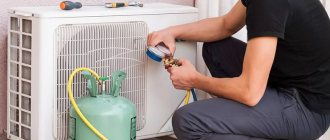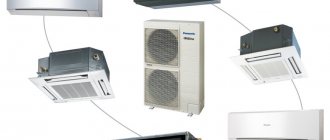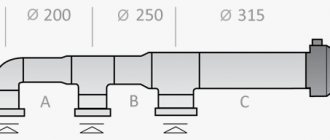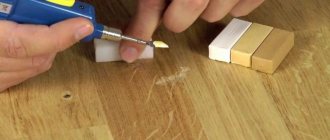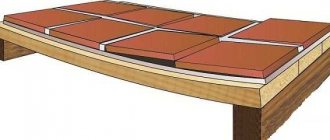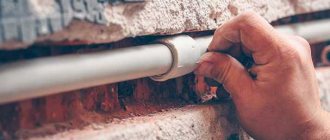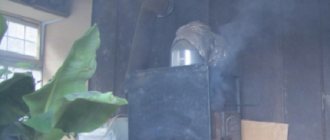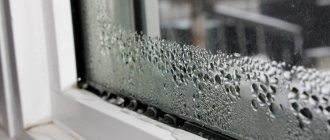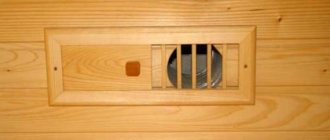Possible causes of extraneous sounds
The first step is to determine the cause of the noise, find out whether it can negatively affect the operation of all equipment or whether the air conditioner is operating normally.
The sounds produced by the air conditioner are divided into safe ones, which do not affect its performance in any way, and dangerous ones, after the occurrence of which measures should be taken to eliminate them.
Safe sounds include crackling and creaking of the housing during operation, and the gurgling of water after switching off. Creaking occurs when the temperature of the operating unit changes, as the plastic expands or contracts slightly. This is a common physical property of any substance. The sound of dripping water occurs when the air conditioner is turned off when the refrigerant flows to the lowest point of the cooling circuit.
You should pay more attention to clicks or sudden changes in noise levels during operation. This indicates a malfunction in the electronics, compressor or engine. If such sounds occur, you should immediately contact the nearest service center in order to localize a possible breakdown in time.
A fully functional air conditioner operates at a noise level of 22-28 dB. This sound comes from the moving parts of the fan and compressor that force air. The noise level is strongly influenced by the build quality of the device itself, as well as the parts used. In most cases, air conditioners from any manufacturer fit within the specified framework.
Typically, an air conditioner makes gurgling sounds in the winter when it is working to heat the room. In this case, extraneous sound can be noticed even when the device is turned off.
There are two main reasons for the gurgling sound:
- incorrect operation of the drainage system;
- airing of the cooling system (freon leakage).
The air conditioner may also gurgle when switching on and off. The compressor accelerates freon through the system when it is turned on, or the movement slows down after it is turned off. Usually this sound is heard for 5-10 minutes. This is considered the norm in the operation of inverter air conditioners.
Where to complain if everything was not resolved peacefully
- Management Company
Here it is worth clarifying whether the split system has been agreed upon with other owners of common property, which is the façade of the building.
- District
A written statement to the district police officer will entail a mandatory conversation and drawing up a protocol regarding the noisy air conditioner installed in the neighbors.
If the split system continues to violate the “silence law,” then administrative liability will arise with the imposition of fines.
- Rospotrebnadzor
The main purpose of contacting Rospotrebnadzor is to organize an examination and measure the noise level from a working split system. The examination is carried out for a fee. But it is she who will be a powerful argument in court. If you are found to be right, the court will oblige the culprit to compensate this amount.
Noises from the drainage system
If extraneous sounds occur when the split system is turned off, this clearly indicates improper installation of drainage for condensate removal. The air conditioner gurgles when a strong wind blows into the pipes. If the mounting angle is incorrect, not all moisture is removed from the system, so bubbles appear under air pressure, and, as a result, a “gurgling” sound in the air conditioner. A water seal may also occur, which will interfere with the drainage of liquid.
The phenomenon occurs if the drainage pipes are not led out into the street, but into the sewer system without a siphon. In this case, gurgling occurs when the split system is turned off. The sound can be transmitted directly from the sewer system or water seal.
Incorrect placement of drainage pipes for discharging condensate either to the street or to the sewer system is a possible cause of an unpleasant sound, but is not common. This is explained by the fact that condensation can only form in warm weather when the air conditioner is operating to cool the room. This is not possible when heating. The main cause of noise in winter is the air in the cooling system.
conclusions
If your air conditioner starts gurgling in winter, it means the problem is either in the drainage system or in the freon circuit. In any case, we strongly recommend calling a specialist first. Well, if this is not possible, then you can check the drainage network yourself for kinks, kinks and other reasons for water stagnation in it. In strong winds, you need to place the condensate drain pipe so that air flows do not enter it. If the problem is in the freon circulation circuit, then you cannot fix it yourself.
We recommend that you read: Features and operating principles of an inverter air conditioner
Violation of the freon circuit
When working to heat a room using an air conditioner, the evaporator and condenser change their purpose. Freon pumped into the system enters the evaporator in a liquid state. Here it condenses and heats up greatly, up to a temperature of 60-80 degrees. The compressor circulates warm air and warms up the room. This is the reverse process of cooling, in which the formation of liquid from gas occurs directly in the condenser unit.
From the evaporator, liquid freon enters the outdoor unit, and this liquid may “gurgle.” The structure in which the processes of evaporation and further condensation of freon occur is completely isolated. If the air conditioner is in working condition, this phenomenon is basically impossible.
Freon circulates in copper tubes, which are sometimes damaged during installation, which violates the integrity of the system and leads to refrigerant leakage and its partial replacement with atmospheric air or moisture. Due to the different compression densities of substances entering the system, gurgling sounds occur.
Why is the air conditioner noisy?
Have you noticed that your air conditioner is starting to make a lot of noise? Should climate control equipment make sounds during operation or is it time for service? Split system users encounter such questions after 2–3 years of operation. Let's figure out why the air conditioner is noisy?
Should it make noise?
To begin with, you should understand that even working equipment makes sounds. High-quality models of air conditioners produce noise within 35 dB. The human ear picks it up like a quiet monotonous whisper. You can compare it with the sound that the wind makes. Over time, the user begins not to notice it; the human ear filters out this noise.
The external unit is louder. Therefore, its correct installation is important. Plus, if plastic windows are installed in the room, the noise level is significantly reduced and it is practically inaudible in the room.
Why is the indoor unit of the air conditioner noisy?
Loud sounds occur for the following reasons:
1. Fan malfunction. Most often this happens due to a failed bearing. Also, the reason may be poor quality technology. This is how the fan blades begin to touch the body of the device, which is made of plastic and has changed its original shape.
2. Difficulties in the passage of refrigerant through the pipes. Occurs due to a narrowed or broken tube. A characteristic hiss will indicate such a problem.
3. Poor quality assembly. Strong vibration is heard when elements are assembled incorrectly. For example, not fully screwed or unnecessary parts (grids, overlays).
Cheap air conditioner models also often make noise. This type of problem cannot be resolved through service. Try replacing the equipment with a similar or different model.
Why is the external unit of the air conditioner noisy?
If your neighbors start complaining about the noise from your air conditioner, then it's time to get it fixed. The following problems lead to such sounds:
1. Filter dirty. All street trash ends up in it. These are fluff, dust, leaves, paper and other contaminants. It needs to be cleaned and possibly completely replaced. To do this you need to disassemble the air conditioner. If you are not confident in your abilities, then call a specialist.
2. Loose body. If a rubber seal is not installed between the block and the container, the device begins to vibrate. A similar noise can be heard when the bolts are not tightened tightly.
3. Lack of protection. The outdoor unit is susceptible to weather damage. If the case material is of poor quality, then over time it will begin to deform. As a result, it will be touched by the fan blades. This problem can be avoided if you protect the air conditioner unit with special canopies and guards.
If your air conditioner is very noisy, you should immediately contact a technician. Because the reasons can be much more serious. Among them is a broken compressor. Or perhaps the noise was generated due to a decrease in voltage in the network. In any case, only a specialist can make a correct diagnosis. Your task is to indicate where the noise is coming from and tell when you noticed the first “symptoms”.
Other causes of noise
There are several indirect reasons that lead to the air conditioner gurgling when turned off in winter.
Freon is a gas that very easily changes its state of aggregation: it turns from gas to liquid and back. In winter, due to the difference in temperature outside and indoors, it circulates. At a colder temperature, the gas cools and is pushed out by the liquid, which has a higher density. With this movement, a characteristic gurgling sound may appear. The same noises can be heard by observing the operation of a refrigerator, the principle of operation of which is similar to the principle of operation of an air conditioner.
Air conditioners that perform the function of heating air have a built-in option for defrosting the outdoor unit. In this case, electric heaters are periodically turned on to thaw the ice on the heat exchanger. There are accompanying noises, clicks and sometimes gurgling. This sound should not be feared, since water dripping onto the pan will not in any way affect the performance of the unit.
In the warm season, noise can be caused by insects, which sometimes set up their home inside various parts of the split system. Ants or cockroaches can create entire colonies whose life activity resembles gurgling. It is quite difficult to distinguish this sound from a mechanical one by ear, especially for a non-specialist.
Dripping sound from air conditioner
The air conditioner is dripping
An air conditioner making a noise that sounds like something is dripping can be a cause for concern. Don't start panicking right away; this may be due to excess moisture entering the drip line. This is completely normal. But the dripping sound becomes a concern due to excess condensation.
High level of condensation. Large amounts of condensation can cause the bath to overflow. To eliminate this noise, you will need to empty the pan.
Freezing of heat exchangers. When the ice from the frozen heat exchanger melts, you will also hear a dripping noise. This can happen for many reasons, including dirty air filters and faulty thermostats, which should be checked by a professional.
Eliminating gurgling air conditioner
We understand the reasons for the gurgling of equipment, and now we will look at how to eliminate them. If the air conditioner makes gurgling noise, before calling a repairman you must:
- See when exactly the sound is heard. While the device is running or disconnected?
- Try to find a place where you can hear extraneous sounds?
- In principle, this is all you can do yourself, without the help of a specialist.
- Since the air conditioner gurgles mainly due to improperly installed drainage pipes, the technician will have to work with it.
If the problem is not in the integrity of the freon circuit, you can try to solve it yourself, without resorting to the help of specialists. First of all, check the angles of inclination of the drainage tubes. The water drainage system is located in such a way that the liquid flows through it by gravity. Bend angles should not be more than 90 degrees. In theory, the sharper the angle, the better.
Tubes that are damaged are replaced, and bends are straightened to acceptable angles. If necessary, the condensate drain pipe can be extended and placed as close to the ground as possible. This will solve the problem of wind getting inside the liquid removal system. It is advisable to clean the filters of the indoor unit, as well as the drainage pan, since extraneous sounds can also form there.
If during installation the drainage system is discharged into the sewer system, check whether the tube is connected through a special siphon for the air conditioner. If not, purchasing a siphon will eliminate unnecessary noise and gurgling from the sewer.
In cases where the above actions did not lead to the desired result, you need to seek help from specialists. The service center technicians will be able to check the tightness of the freon circuit and, if necessary, top up with refrigerant.
If the problem is not corrected in time, further operation will lead to breakdown of the air conditioner, and repairs are much more expensive than localizing the fault.
It is recommended to carry out scheduled maintenance, which in most cases will be able to identify the malfunction at an early stage and localize it. Self-diagnosis is carried out at least three times a year. In the summer, when the air conditioner works practically without turning off, maintenance is carried out once or twice a month. You can carry out maintenance of the indoor unit yourself; just wash the filters with warm water and soap. The outdoor unit should be periodically cleaned of large debris.
The gurgling sound of a switched off air conditioner in winter
If the air conditioner makes gurgling sounds when it is turned off, then it is worth repairing:
- On your own. You can fix some breakdowns that give off a characteristic sound on your own. For example, “gurgling” can be eliminated by bending the drainage tube. In this way, the condensate can be drained into the sewer system; for this reason, air blowing is excluded in 99%.
- By contacting a specialist. Any types of breakdowns that lead to changes in noise during operation must first be identified. If the breakdowns are related to the operation of the automation or refilling the refrigerant, then it is unlikely that you can remove the cause and breakdown yourself.
In winter, the weather is very often windy, so unpleasant sounds are often annoying.
If the air conditioner gurgles when turned off in winter due to improper bending of the drain hose, you can plug this tube with a cloth. Of course, this must be done on the condition that the device will not operate in winter.
If it is impossible to plug the pipe, you should try to carefully bend the hose correctly. This is difficult to do in winter. The tube may be completely frozen, and then it will simply break off.
There are situations when a switched-off air conditioner gurgles in cold weather without wind. This happens when the device is installed near batteries. They will heat up the freon, after which it will begin to flow backwards into the indoor unit, because his temperature is higher. This can only be corrected by reinstalling the system, although the situation itself does not lead to a breakdown.
When the air conditioner works for heating in winter, it can also gurgle. During operation of the device, the defrost mode will periodically turn on, which is accompanied by a characteristic noise. This situation does not require intervention.
How and when to self-test your air conditioner
Self-diagnosis, which thrifty cooler owners resort to, is carried out three times a year, and in the hot season, when the air conditioner requires a lot of additional work, the number of checks increases to one per month. Replacement of parts damaged by power surges is carried out only by experienced specialists.
The noise of the air conditioner is not only annoying, but also frightening to the owner of the cooler. A working climate control unit cannot make noticeable sounds.
Noise, especially gurgling sounds reminiscent of an open kitchen faucet, is a signal for an immediate response from the owner. The best option is to call a technician for a comprehensive diagnosis of the air conditioner. The causes of breakdowns, which become known due to the gurgling of the external unit of the device, cannot go away on their own. Proper care of the air conditioner indicates that its owner cares about the health of all household members.
An air conditioner gurgles - a phenomenon that causes bewilderment, laughter, and even anger among the owners of coolers. A simple but expensive unit for your home or office can produce annoying, too loud sounds when problems occur. What to do in such cases? Gurgling in an air conditioner is always an alarming sign, which is an unaffordable luxury to ignore, because expensive repairs will cost twice as much as timely diagnostics of the entire climate control device. The characteristic sound is difficult to confuse with similar noise atypical for an air conditioner, but it is still difficult for an inexperienced person to determine the true deviations in the operation of the cooler (only by ear). If the air conditioner gurgles, and calling a technician is impossible for various reasons, then the owner of the device should understand the probable causes of the problem.
Gurgling in the air conditioner is a signal of a problem
Air conditioner gurgles when it's windy
Quite often you can hear something gurgling in technology. This sound usually appears not only when the air conditioner is running, but also when it is turned off.
The reasons for extraneous sounds can be very diverse; they do not always mean that the equipment is no longer suitable for use, but they also should not be neglected. Most often, gurgling indicates that water has accumulated in drainage systems and occurs mainly during strong gusts of wind.
Possible reasons could be:
- Air is blown into the drainage tube, but the water (condensate) has not yet completely drained through it. The sound is similar to the gurgling of water in a glass if you lower a tube into it and blow. The problem most often occurs when the air conditioner was recently turned off.
- There is a strong bend in the drainage tube between the blocks (internal and external). Water may remain in bent areas. Air blowing into the drainage will cause gurgling.
- Air getting into the freon line. Most often this problem occurs due to strong winds.
- If the drainage hose is led into the sewer, the squelching noise can be transmitted from there (from the sewer pipe or water seal). In this case, the sound can be heard both when the air conditioner is running and when it is turned off.
- If insects (bees, flies, or others) have settled inside the housing, their buzzing can be confused with the gurgling of water. You can hear it regardless of operating mode and weather. The humming noise can be easily identified if you listen to the sound near the air conditioner.
The most common cause of gurgling is errors during installation of the drainage tube.
